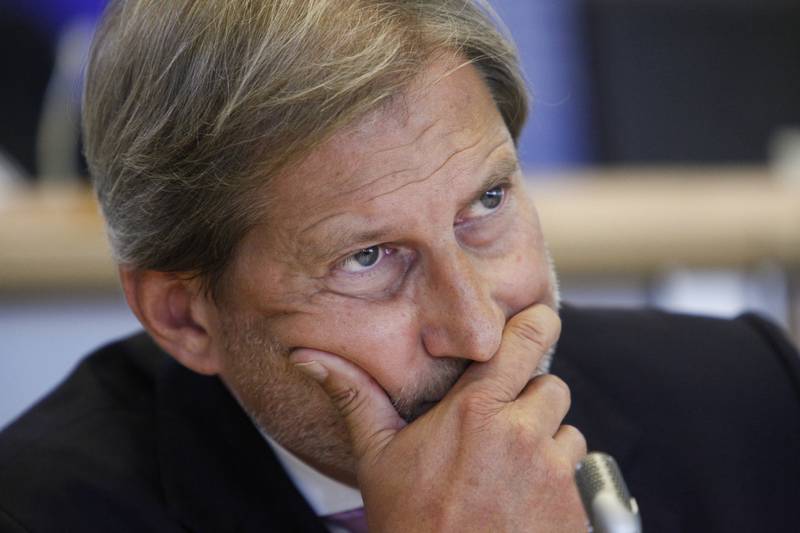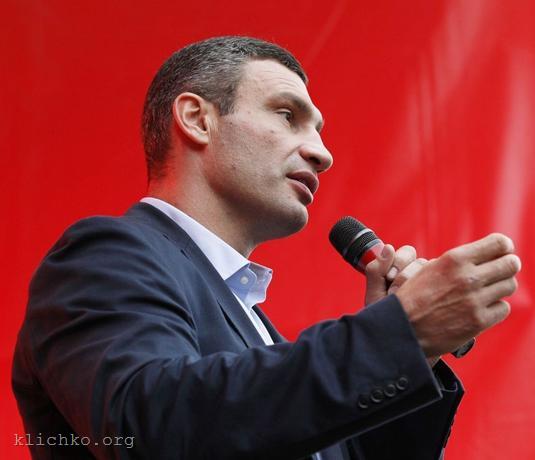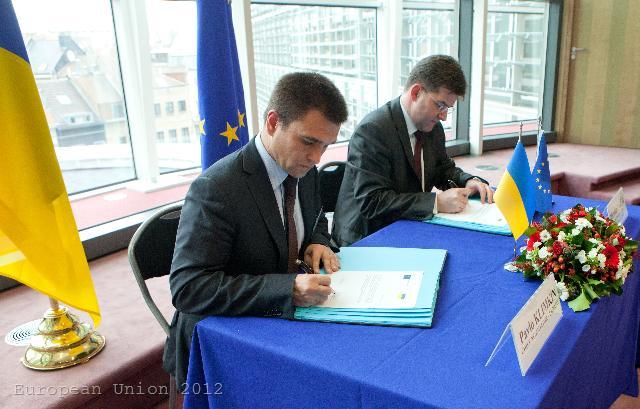Ukraine Is the Stake in the Eastern Partnership
Adelina Marini, September 27, 2011
 There is a full unanimity among analysts in Europe that in a broader perspective it depends on Ukraine the Eastern Partnership to succeed, and in a closer perspective - Ukraine's success will depend on the trial of Yulia Tymoshenko, a former prime minister of the country. As Martin Simecka wrote in the Prague-based magazine Respekt, "whether Ukraine with its nearly fifty million people will end up under the control of Russia or within the EU’s sphere of influence will settle the fate of the remainder of eastern Europe’s smaller countries, like Moldova, Belarus and Georgia".
There is a full unanimity among analysts in Europe that in a broader perspective it depends on Ukraine the Eastern Partnership to succeed, and in a closer perspective - Ukraine's success will depend on the trial of Yulia Tymoshenko, a former prime minister of the country. As Martin Simecka wrote in the Prague-based magazine Respekt, "whether Ukraine with its nearly fifty million people will end up under the control of Russia or within the EU’s sphere of influence will settle the fate of the remainder of eastern Europe’s smaller countries, like Moldova, Belarus and Georgia".
Currently Ukraine is in a very tough situation. In Russia, next year there will be presidential elections and, as it became clear recently, President Dmitry Medvedev ceded the right to PM Vladimir Putin to run for a third presidential term. A fact that will have a huge impact on the processes in Ukraine. On the other hand, the European Union, who has the pretences of being a champion of democratic transformation, is somehow distant, and today it is totally consumed by its numerous problems - from the debt crisis in the eurozone and the expectations of a Greek default, via the Arab Spring and the test with the inflows of refugees and migrants, to the global feeling of an upcoming crisis.
In this entire context on September 29-30, in Warsaw the summit between the EU and the Eastern Partnership countries will take place and Ukraine will be in the spotlight.
Why?
As Amanda Paul and Vasyl Belmega point out, with the European Policy Centre, Ukraine is the first country in the European Neighbourhood Policy (ENP) that is negotiating on a deeper and comprehensive free trade agreement (DCFTA), separately from the Association Agreement. This agreement will significantly boost Ukraine's relations with the EU, because free trade was a core element of the integration of the countries from Central and Eastern Europe. The agreement will open the doors for significant flows of capital and investment into the Ukrainian economy and will facilitate the country's integration in the world economy.
And if this sounds seducing enough, from the east Russia is reaching out with another economically lucrative proposal - including Ukraine in the Customs Union, already established by Russia, Belarus and Kazakhstan. The authors point out that Moscow wants Kyiv to end the negotiations on the DCFTA and to sign up to the Customs Union. According to them, in the short-term, the membership in the Customs Union will bring some economic benefits but will not facilitate Ukraine's integration in the global economy. It will rather conserve the non-competitiveness and energy dependence of its industry. Moreover, Amanda Paul and Vasyl Belmega write that it will be strategically dangerous for Ukraine to join something which has unclear future.
Against this backdrop, the trade indicators of the relations between Ukraine and the EU are more than eloquent. According to World Bank's data, the population of the country is 45.4mn people, and the gross domestic product was 102.9bn euro in 2010. GDP per capita was 2,262.7bn euro in 2010. EU exports to Ukraine in 2009 amounted to 13.9bn euro and the import from Ukraine amounted to 7.9bn euro. Ukraine exports mainly agriculture products, energy, chemicals, iron and steel, while the EU exports for its enormous eastern neighbour machinery, transport equipment, chemicals, textiles and clothing, agriculture products.
Visa liberalisation
During the November EU-Ukraine summit last year Ukraine received an Action Plan for visa liberalisation. This is an issue of great importance for Ukraine but quite sensitive for the EU at the moment. But the facts speak for themselves. One of every ten Schengen visas is being issued to an Ukrainian citizen. Currently the Union is in a process of reforming Schengen's governance because of the impact of the Arab Spring and growing internal pressure. The authors of the analysis from the European Policy Centre think that visa liberalisation must be underscored in the Warsaw Declaration that is to be adopted at the summit, because this will demonstrate EU's serious intentions for a more ambitious partnership with its eastern partners.
However, dark clouds are gathering above the visa liberalisation for another reason - the Western Balkans, who have received visa reliefs but it is getting clearer that those reliefs are being abused with. And the latest data, presented during the Justice and Home Affairs Council on September 22nd shows that in 2010 over 17,000 Serbs had asked for asylum in the EU. This is why the Union threatened to remove the liberalisation and restore the previous situation. Given the internal political situation, there are no grounds to think that this will not happen with Ukraine too, if its citizens were granted easy access to the EU.
Amanda Paul and Vasyl Belmega think that the EU should not allow the negotiations on visa liberalisation to fall victim of more serious issues, because the ordinary citizens should not pay the bill of their leaders' actions. This, however, is a mistake often made for countries in transition like Bulgaria, Romania, the countries in the Western Balkans and the Caucasus - to make a distinction between the citizens and politicians because, in the end of the day, it is the citizens who have to ask their rulers to implement the reforms that would guarantee them problem-free movement in the European Union and good trade relations. We cannot always assume that citizens need paternal attitude, as Russia does, and the politicians to be regarded as enemies (also a Russian approach).
Mrs Tymoshenko
The biggest stake for the negotiations on the deeper trade agreement with Ukraine is the trial against former PM of Ukraine Yulia Tymoshenko, who is  currently in detention, charged with signing a contract for gas deliveries in 2009 with Russia. According to Amanda Paul and Vasyl Belmega, Tymoshenko can be released if Article 365 from the Criminal Code were to be decriminalised which will lead to two outcomes. First is that the EU would be satisfied that Ukraine's leadership had taken on board its criticism, while Ukraine's leadership would save face and hopefully start to focus on more serious issues. And what needs to be done is not little at all, the analysts write.
currently in detention, charged with signing a contract for gas deliveries in 2009 with Russia. According to Amanda Paul and Vasyl Belmega, Tymoshenko can be released if Article 365 from the Criminal Code were to be decriminalised which will lead to two outcomes. First is that the EU would be satisfied that Ukraine's leadership had taken on board its criticism, while Ukraine's leadership would save face and hopefully start to focus on more serious issues. And what needs to be done is not little at all, the analysts write.
In its report this year on Ukraine, under the implementation of the Action Plans of the ENP, many of the planned reforms are incomplete. The process of reform must include as many political and civil structure as possible in order to avoid past mistakes, such as the reinstatement of the 1996 Constitution and making changes to electoral law only weeks before the November 2010 local elections. Comprehensive judicial and constitutional reform and greater efforts to fight corruption remain crucial, is another conclusion in the report.
It is these reforms that will be a big test for Ukraine and the European Union, who is expected to have learnt from Bulgaria's and Romania's failures, the two countries that were accepted in good faith to become EU members five years ago, but their frivolous attitude toward this type of reforms led to a deadlock for their accession in Schengen. The above mentioned report of the Commission expresses concern over standards of democracy, fundamental freedoms and the rule of law. The pro-Russian president Viktor Yanukovich, who has won the elections in 2010, is accused of eroding democracy by centralising power, while there have also been concerns about claims of intimidation of journalists and restrictions on freedom of assembly.
The EU wants to see Ukraine as a close partner
 This is what EU Enlargement Commissioner Stefan Fule said on September 21 at the conference "Ukraine 20 Years On: Challenges for the Future". According to him, 2011 is critically important for Ukraine. "The celebration of its 20th anniversary of independence will hopefully coincide with the finalisation of our new Association Agreement at the Summit in December". Mr Fule underlined, however, that the negotiations on the agreement were only the beginning of delivering on our mutual commitments. "Several challenges remain. I would like to emphasise specifically the rule of law, an issue which I had the opportunity to discuss with my Ukrainian counterparts at the Yalta conference last week".
This is what EU Enlargement Commissioner Stefan Fule said on September 21 at the conference "Ukraine 20 Years On: Challenges for the Future". According to him, 2011 is critically important for Ukraine. "The celebration of its 20th anniversary of independence will hopefully coincide with the finalisation of our new Association Agreement at the Summit in December". Mr Fule underlined, however, that the negotiations on the agreement were only the beginning of delivering on our mutual commitments. "Several challenges remain. I would like to emphasise specifically the rule of law, an issue which I had the opportunity to discuss with my Ukrainian counterparts at the Yalta conference last week".
Stefan Fule also said that the upcoming Eastern Partnership summit would be an occasion for Ukraine to demonstrate that it could lead the Eastern Partnership, especially in its capacity of a pioneer in the alignment with EU values and approximation with EU standards for the benefit of all its citizens. But if we take stock of our recent experience with political transformations in Central and Eastern Europe, 20 years are not enough for countries like Ukraine, which is still wandering between the East and the West. And what is more important, whose citizens still stand aside the political processes, probably believing that they had depleted their role with the Orange revolution of 2004.
 Johannes Hahn | © European Parliament
Johannes Hahn | © European Parliament | © klichko.org
| © klichko.org | © European Union 2012
| © European Union 2012